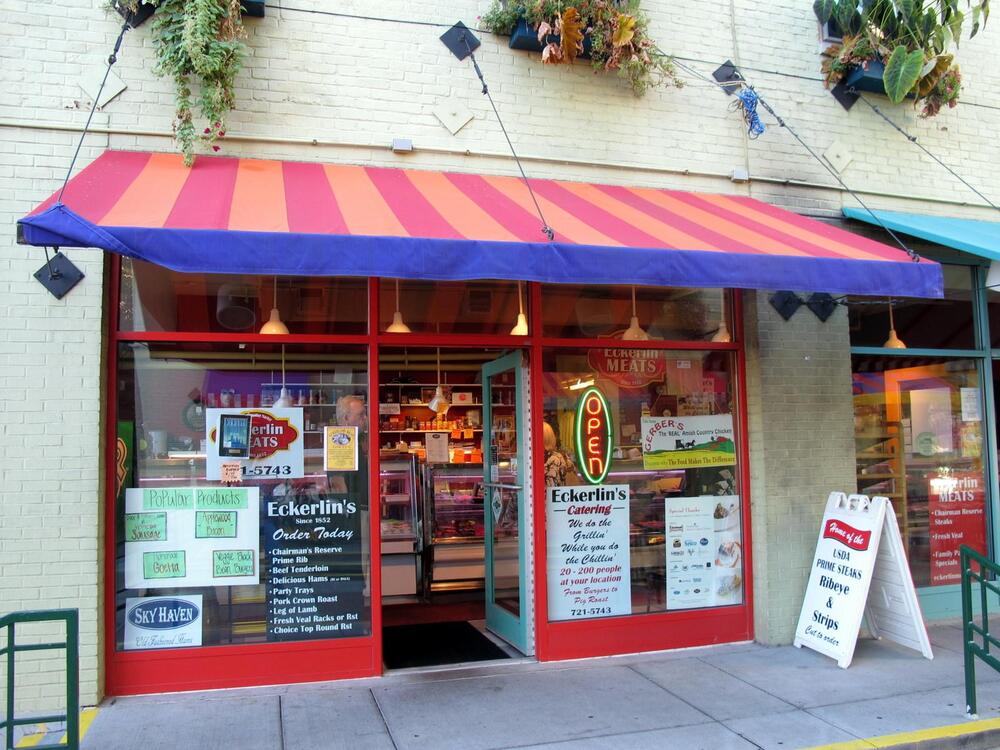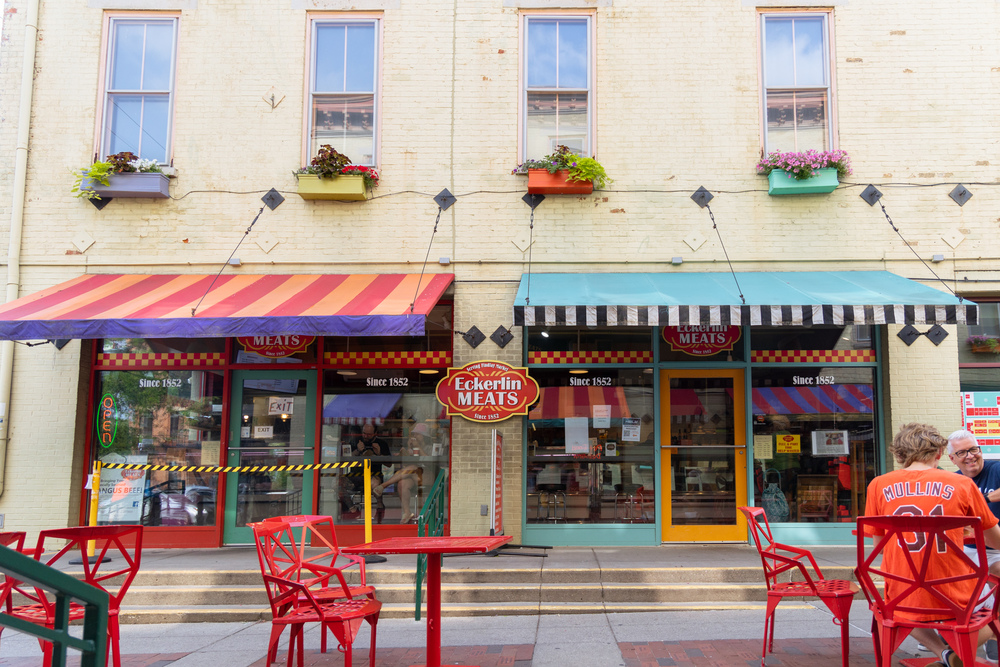
The Early Years at 48-52 Elder
What is now Eckerlin’s was historically three separate buildings with two, sometimes three, storefronts in operation. Often, 112 and 114 W. Elder shared a commercial space. Earliest business uses of the buildings included coffee houses and dry goods shops.
The famous company, Alms & Doepke, has connections to 112 W. Elder since William Alms had a dry goods shop there in 1859-1861 before he started Alms & Doepke with his brother and cousin. Beginning in 1872, 112 W. Elder became a saloon, first under Jacob Ledig and then the Aichele family, which lasted until 1895.
From 1875 until the end of World War I, Henry Hutzler and his sons sold hosiery and notions from 116 W. Elder’s storefront, followed by Frank and Lena Klein. Their ladies’ furnishings shop lasted until 1941 at which point William Rothenberg purchased the building and then operated Rothenberg’s Shoes. That business lasted to 1996.
Next door at 112-114 W. Elder, Alexander B. Heilemann sold shoes from 1904 to 1923. He was followed by Steiner Hardware and then Acme Hardware which remained inside 112-114 W. Elder until the 1980s. The city purchased the buildings in 1996 and in 2010, Pho Lang Thang moved into them.
In the rear of 116 W. Elder, Eckerlin’s also operates to this day. 112-116 W. Elder—now one building that houses Pho Lang Thang and Eckerlin’s—was originally three separate structures numbered 48-52 Elder.
Built around 1858-1859, each had a separate storefront, although 48 and 50 Elder usually shared a commercial space. The first commercial tenant of 48 Elder was William Herman Alms (1842-1920) who ran a dry goods shop there from 1859-1861. William was a second-generation German immigrant, born in Cincinnati in 1842 to Gerhardt Heinrich Alms and Louisa (Behrens) who were both from Hanover. William and his wife Anna Elizabeth (Bogen) (1847-1917) raised their family in Over-the-Rhine. Their children included William (1866-1867), Evelyn (1871-1946), Louise (Burdsal) (1872-1933), Clarence (1874-1875) and Elleanor (1882-1883).
After William Alms’ time at 48 Elder, Aaron Burtanger (1828-1906) then ran a dry goods shop there in 1862 and 1863. In 1864-1865, John Ruf (1825-1870) and his business partner Gottlieb Eha (1833-1884) ran their shoe and boot store from 48 Elder until 1866 at which point they moved one building over to 46 Elder (where they remained through the 1870s).
Both John and Gottlieb were German immigrants and Civil War soldiers: In 1862, Conrad Distel (1807-1880) ran another coffee shop from 52 Elder. Conrad was a German immigrant, born in 1807 in Baden. After his time at 52 Elder, he spent the rest of his life running a series of saloons in the Northern Liberties.
Then, in 1867, Nicholas Fetsch—a German immigrant born in Bavaria around 1830, a tailor by training and a Civil War veteran—sold dry goods from 52 Elder’s storefront. He and his family had already been living at the building since 1863. From 1868 to 1870, Kortemeyer, Freer & Company—run by Clemens Kortemeyer and his business associates, H. Freer and Harry Tabler—sold dry goods at 52 Elder. Clemens (1846-1900) was a Prussian immigrant, born in 1846. He immigrated in 1865 and married his wife Theresa (Bueoker) (1851-1929) here in 1870; she gave birth to six children, all of whom lived into adulthood.
Beginning in 1870, Clemens Albers (1827-1875) and Jacob Haas (1828-1902) ran a provisions store from 48-50 Elder. Upon Clemens’ death (the senior) in 1875, Albers & Haas ended. Widowed Elizabeth then kept a grocery on Findlay Street with the help of her eldest son Clemens. At the time of Clemens’ death, Jacob Haas was already working with Nicholas Diehl (1849-1932) at 108 W. Elder for their commission produce company that lasted from 1879 to 1889.
From 1872 to 1876, Jacob Ledig, a French-German immigrant, ran a saloon at 48-50 Elder. He and his family also lived at 48 Elder at that time. In 1878, the space became Gottlieb Aichele’s saloon. He called his bar “the Findlay Market Exchange.” Ten years later, in 1888, Gottlieb succumbed to a number of ailments—pneumonia, dropsy and “congestion of liver”—and passed away at home at 48 Elder.
Thereafter, his widow Margaret “Maggie” (Wiegele) ran the bar until 1895. There was briefly a butter and eggs business—Reir & Godar—at 48 Elder after Maggie’s saloon. By 1900, the commercial space there transitioned to Frank H. Holtmeier’s short-lived business. He ran a commission merchant operation at 48 Elder, though this was a professional aberration since, both immediately before and after this, he worked as a carriage trimmer.
For most of 50 Elder’s history, its commercial space was used in conjunction with 48 Elder. Occasionally, though, the space had its own business venture. In the early 1870s, Louis Meyer sold paper hangings—wallpaper—from there. Then, from 1878 to 1889, John Iffland operated a bakery in the storefront. Soon the space became a shoe shop, first under C. Hamburger and then William J. Orr who operated his business from the space from 1899 to 1903.
The Early 20th Century at 112-116 W. Elder
From 1904 until 1923, 48-50 Elder—then renumbered to 112-114 W. Elder—housed Alexander B. Heilemann’s (1887-1958) shoe store. Alexander grew up in the shoe business. His grandfather John B. Heilemann (1818-1901) was a shoe manufacturer born in Germany in 1818. He immigrated to the U.S. in 1846 and three years later, he and his wife Elizabeth wed. After Heilemann’s, 112-114 W. Elder transitioned to a hardware store under the Steiner family.
Charles and Mary Catherine Steiner, a brother-sister team, first ran a cookware and appliances store out of the storefront at 119 W. Elder (now Saigon Market) from the early 1900s through the 1920s. The Steiner family, as early as the 1880s, lived at 119-121 W. Elder before they moved to 112-114 W. Elder. Charles (1869-1949) and Mary, born in 1871 (who went by Catherine) were the children of German immigrants: Theodore, born in 1842 in Baden, and Catherine, born in 1846 in Bavaria.
After they immigrated to the U.S., Theodore worked as a cigar-maker after he served in the Civil War. Their children—the hardware store proprietors—began work young in life. Earning wages as a knitter, Catherine first earned income as a part of the garment industry like many other young single women. After that, she—in a move that undoubtedly resulted in higher wages—also worked as a typist. Her brother eventually became a blacksmith.
While the family was living at 119 W. Elder in the 1880s and ‘90s, Theodore was admitted to the Longview Asylum near Carthage along the Miami-Erie Canal. The asylum was a place for anyone suffering from any kind of mental illness, but due to overcapacity and underfunding, around a quarter of the inmates succumbed to infectious disease there and many others died due to severe malnutrition. Theodore remained there until his death in 1911.
Theodore’s admission to Longview meant that Charles and his sister no longer had a father to rely on for familial income. The hardware store was the answer to their livelihood needs. They were like many other retailers in the 1920s in that they allowed customers to purchase items with credit and through installment plans. Expensive goods like washers could be bought for $1.50 a week at Steiner’s instead of having to pay $99 up front. In addition to running the store with his sister, Charles was a blacksmith by trade who manufactured the bodies of carriages. His wife was Ella (Dorey), born around 1873.
After her and Charles’ wedding in 1898, she gave birth to several children, including Clarence, Mary, Raymond and Charles. Catherine, Charles’ sister, did not marry. Charles was known, in his management of the store, for being “economical.” One person recalled, “Mr. Steiner never would throw anything away. He was very economical. I can remember when I was a kid and used to come in the store. It was always very dark. I'd tell him what I wanted and he would go to the place where it was kept, turn on a 15 or 20-watt bulb, get the item I wanted and turn out the light again."
Next door, at 116 W. Elder, from 1875 until the end of World War I, Henry Hutzler (1842-1921) sold hosiery and notions from the storefront. Born in 1842 in the German town of Pirmasens near France, Henry immigrated to the U.S. in 1854 and met his wife Carrie (Harting)—a German immigrant—here in Cincinnati. After Hutlzer’s, Lena Klein (18 75-1945), with the help of her husband Frank (1871-1957), sold women’s furnishings from 116 W. Elder from 1920 to 1941. They also owned the building.
Born in Austria-Hungary in 1875, Lena (Katz) was a Hungarian Jewish immigrant who came to the U.S. in 1902. She worked with her husband Frank—also a Hungarian Jewish immigrant—in the dry goods business. Their first shop was at 1533 Central Avenue before they moved to Findlay Market and specialized in women’s goods.
Their daughters Irene and Rose (Price) also assisted the family business, working as salesladies. In 1943, Charles Steiner sold his hardware store at 112-114 W. Elder to William Gabriel at which point it became Acme Hardware until the 1980s. Acme was known for having all the useful devices and appliances a hardware store normally had; it was also known for having items very rarely—but occasionally—asked for, such as a set of “buggy jacks,” a “spoke shaver” (used for shaping spokes of wagon wheels) and a lefthand instrument with a large blade for which Acme management did not have a name.
The workers there said that it was important to keep obsolete items even into the mid-20th century since someone came in every so often and asked for an old tool that was no longer manufactured. Next door, by Pleasant Street, William Howard Rothenberg (1893-1971) purchased 116 W. Elder from Lena Klein in 1941 for one dollar. This, plus the fact that Lena Klein’s stock was auctioned off in 1941, suggests that the Klein’s business was failing and needed to be sold. Rothenberg Shoes lasted to the late 1990s. Born in Kalvarija in what is now Lithuania (and what was then Russia) in 1893 to Abraham (1868-1952) and Bertha (Pekarsky) (1872-1931), William Rothenberg came to the U.S. in 1907 after traveling through Rotterdam, Holland, and New York City. After settling first in New York City and then Dayton, he returned to Europe to fight in World War I.
He enlisted on October 2, 1917 and served in the Army until after the conflict had ended. He came back to Dayton in 1919 and then moved to Cincinnati where he married Fannie (Hellman) (1894-1974) in 1923. William passed away in 1971. The building transferred to his son David who owned it until 1996 at which point the city of Cincinnati possessed 112-116 W. Elder. The city still owns the buildings to this day. In 2005, Paula’s Gourmet Café—a restaurant known for its sandwiches that also had a location on 4th Street—moved into 112 W. Elder.
It lasted until 2008. Charles S. Bare Meats—a longstanding Findlay Market company, started in 1909—also had a butcher shop briefly in 114 W. Elder. Then, in 2010, Duy Nguyen and his brothers Bao and David Le started Pho Lang Thang at 112-116 W. Elder. Eckerlin’s Meats additionally operated from the rear of 116 W. Elder and continues to do so. Eckerlin’s is a Findlay Market mainstay, run by the Lillis family.
It was originally started by Albert “Ernie” Eckerlin (1864-1937), a German immigrant from Müllheim in Baden, who—in addition to his slaughterhouse—had a stand at Findlay Market for many years. Ernie’s daughter Frieda (1900-1989) worked with him. Upon her marriage to Albert Lillis (1899-1953), the Eckerlins and Lillis family joined forces for the business. Albert and Frieda’s son Bob helped to manage the business, and now Bob’s son Bob Jr. and his children are currently in charge of Eckerlin’s.
Images

